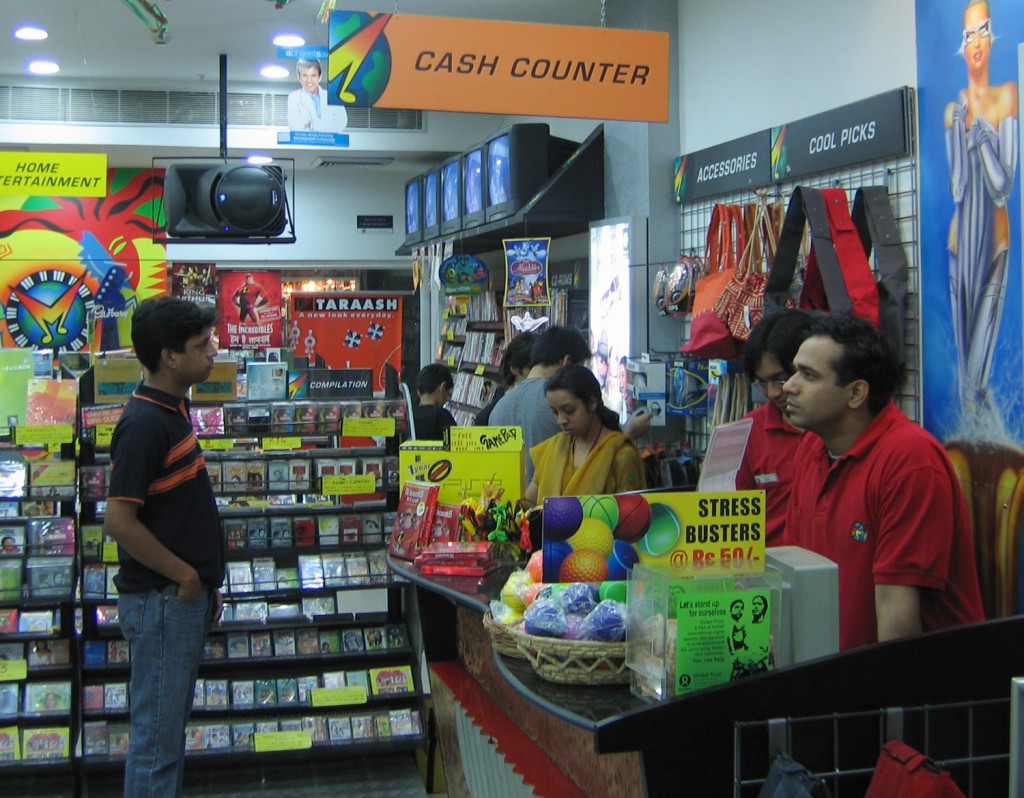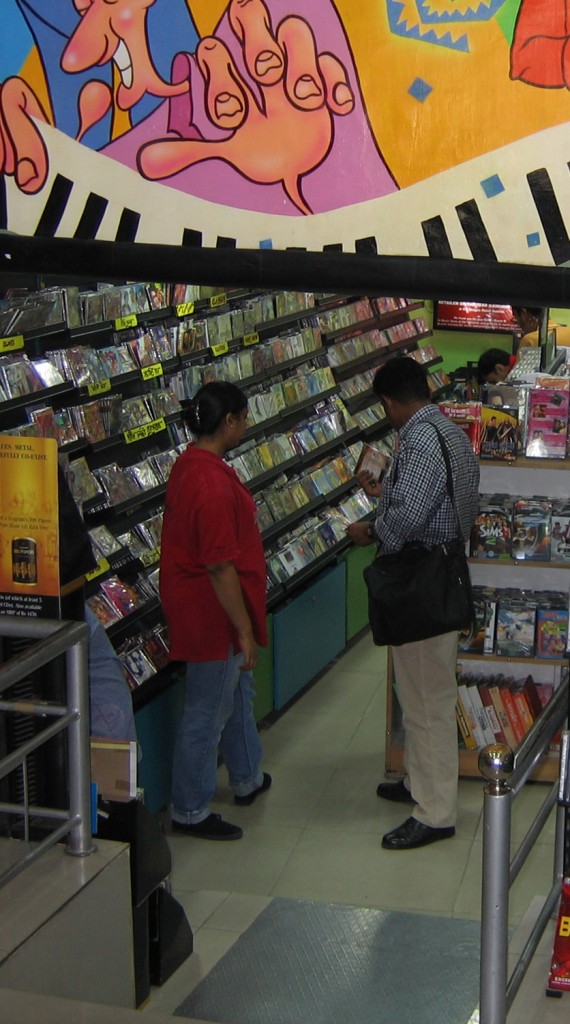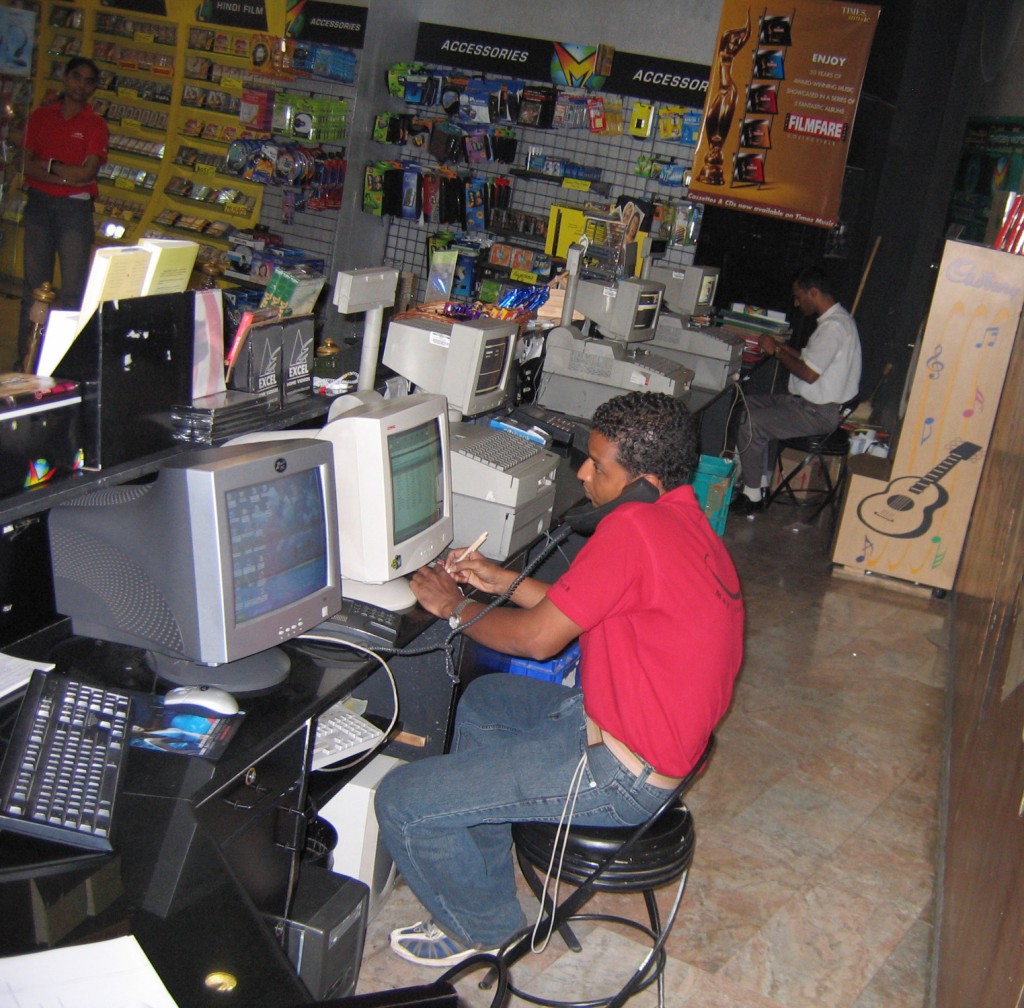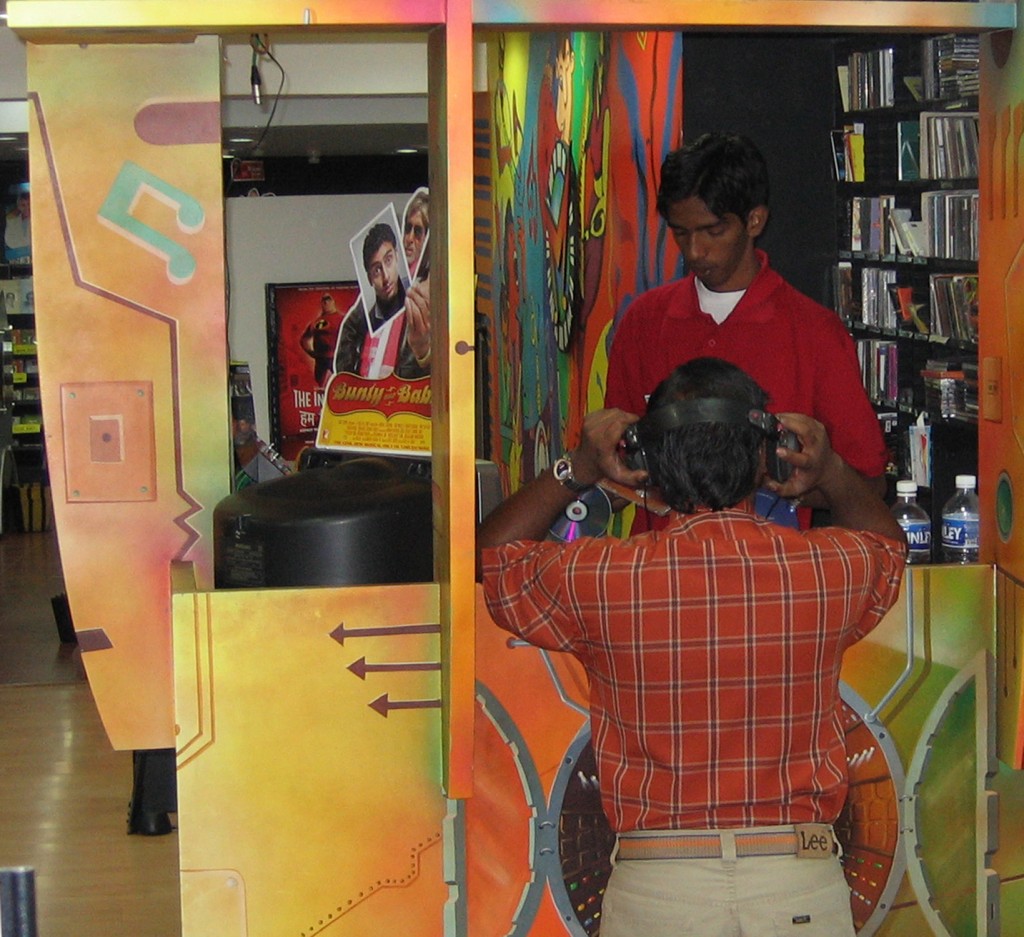The Indian music industry of the early 2000s was extremely volatile, as the overproduction of new recordings and ready availability of pirated material led to a decline in overall sales and waning profitability for the physical circulation of recorded music. Indian music retailers had to navigate a complex social and business environment in which their customers could shop for music in a bewildering array of successful retail outlets, ranging from street hawkers to family-owned shops to large, organized chain stores, to mobile phone providers.
Until the mid-1990s, instead, the overwhelming preponderance of music shops in India were small, family-run affairs, in which customers were separated from recordings by a sales counter; their handling of recordings was thus mediated by shopkeepers and their assistants. While this model is still quite common in India, economic policy changes in the 1990s cleared the way for large retail chains based upon international models to promote a different kind of shopping experience. New retail outlets presented enormous collections of music in open shelving, encouraging customers to carefully browse through the merchandise and take in the store’s advertising displays and product packaging.
At the earliest stages of this research in Mumbai and other cities from 2003 to 2005, I set out to explore the rise of these new Indian retail chains as an indication of the country’s changing economic structures. I soon came to realize, however, that the changes in Indian consumption patterns involved not only new kinds of retail spaces but also conflicts among different kinds of values. Scholars in many disciplines have investigated the diverse social values associated with music but have only rarely made detailed investigations into the cultural dimensions of music in retail contexts (cf. Manuel 1993). I found that the exchanges and choices taking place in music stores were in no way reducible to mere economics: they were inseparable from local contexts—entailed performances of identity, displays of ideology, and broad social attributions of worth, importance, and desirability.
This essay is drawn from my current book project Music as Merchandise, an ethnographic study of how music is bought and sold in contemporary India. My central argument in the book is that Indian retailers invoke different social values to sell music and that by studying sites of exchange, we can gain powerful new insights into the ways that economic transactions are circumscribed by broader social value systems. I show how Indian retailers creatively mobilized value discourses to sell music and to navigate a complicated social terrain that included the symbiosis of the film and music industries, the growing influence of international corporate business models, the rise of the “new Indian middle classes,” the development of new media technologies, and conflicting perspectives on the social purposes of music.
I focus here on one of the inherent contradictions in so-called “organized retail” in India, as one chain of music stores selling recorded music and other media oriented its brand strategy to attract a particular kind of high-class clientele. Yet individual employees of these stores had to mitigate their own class standing and the relatively low status of retail salespeople in order to perform the class habitus of the new middle classes that the chain tried to attract. As such, this performative dimension of selling, and employee gaps in knowledge, led to the lamination of new sets of values onto the music commodities they were selling. In other words, it was not just that store employees sold music (in addition to their other duties), but to a very great extent they had to sell themselves as competent knowledge producers of the commodities for sale in order to gain customer trust. Accordingly, the sale of music not only implicated the performance of class habitus, language politics, and the values embedded in the neoliberal category of “retailing” (as opposed to a “shopkeeping”) but also pointed to the tensions between social and economic values of music and the ways music—when in its commodity status—is attributed with qualities that distinguish it from other kinds of commodities (Beaster-Jones 2014).
Retail spaces, labor, and the Indian middle classes
In discussions of the effects of India’s post-1991 neoliberal trajectory, the practices, ideologies, and relative size of the “new” urban middle classes became a fashionable subject of debate, particularly with regard to their orientation toward changing ideologies about consumption (e.g., Fernandes 2009). A category of people believed to be the main beneficiary of liberalizing economic policy, the new Indian middle class has largely been characterized by scholars as a group that has lost its faith in the Nehruvian planned economy, focusing its aspirations instead on the fruits that emerged from the efflorescence of global capitalism and the opportunities afforded by state divestment in the financial and industrial sectors (e.g., Mazzarella 2003). If the ideal type of the old middle class was the austere civil servant, the ideal type of the new middle class is the cosmopolitan marketing executive (e.g., Oza 2006). Although the white-collar labor of call center workers, computer programmers, and marketing executives has been the focus of much scholarly interest, less attention has been paid to the emergence of retail labor over the past decade. As chains of retail stores continue to emerge in India, there is a greater and greater need for a particular kind of educated middle-class labor to work in these retail spaces. But as I will suggest, this emergent labor pool looks significantly different from the ideal type of middle class of the popular imagination.
One of my sites of attention is a national chain of retail stores in urban India pseudonymously named Music Metropolis. With locations in every region of India, Music Metropolis was the retail division of one of India’s largest media conglomerates and operated stores in a variety of different market contexts, from large flagship stores in metropolitan India to smaller outlets in suburban shopping malls. In order to attract their best customers, Music Metropolis produced a cosmopolitan space as a component of its brand management strategy that largely adopted models from other parts of the world, most notably HMV and Virgin Megastore.

Image 1: Customer Service Associates (CSAs) at the cash counter in a Noida Music Metropolis store (photo by author)
However, creating this cosmopolitan space in the socioeconomic milieu of early 2000s India had particular challenges. Foremost among these was finding well-educated, music-knowledgeable youth to sell music for wages that were approximately half of what these youth might earn at a call center, albeit with better hours. As the most visible employees of this retail space, Customer Service Associates (CSAs) were charged with the task of selling music and multimedia and served as local guides to the geography of the store. That is, in addition to maintaining the physical space of the store, CSAs were expected to initiate interactions with customers, assess the customer tastes, suggest additional products that the customer may like, and otherwise ensure that the customer had a positive shopping experience (especially “high value customers”). As such, CSAs were the face of the brand and the focal point of interaction for most customers. Accordingly, Music Metropolis managers frequently suggested that CSAs were most critical for brand success and hiring was carefully conducted.
While CSAs came from a wide variety of social backgrounds, there were nevertheless some patterns for this entry-level retail position despite the usual high turnover in this sector. Many CSAs at Music Metropolis were working their very first jobs outside of the home. Most of the CSAs were in their 20s and had at least a 12th standard (grade), English-medium education. Many had a few years of college education and had either dropped out or were pursuing a degree by correspondence. Most CSAs came from single-income families, and for about 90 percent of them, their salary contributed to the household resources. Nationwide, Music Metropolis’ CSAs were paid about Rs 4-5000 (approximately $95 to $105) monthly, which managers pointed out was a middle-level salary in organized retail contexts. While this is less than half the salary of a call center worker, it was significantly higher than the salary of music assistants working in local music shops and had much better working hours than call center work. Nevertheless, it is noteworthy that even in the mid-2000s, music recordings and DVDs were still considered luxury items by many Indian consumers. Thus, the CSA monthly salaries did not provide a large scope for building their own music collections, especially since their salary and social backgrounds largely limited their discretionary income.
Hiring class: Habitus and language politics
The basic information that Music Metropolis gathered from its CSA candidates in job interviews was very similar to other Indian retail contexts and not always verbally communicated. Was the candidate well groomed? How was his or her hygiene? Could this person be comfortable speaking to upper-middle-class clientele, demonstrating the proper musical knowledge, in the English language? Was this person comfortable wearing the requisite uniform of jeans and polo shirt in a public space? Did they have the proper knowledge and bearing to convincingly sell music? In slightly different terms, the unspoken key component to recruiting CSAs for Music Metropolis was their ability to convincingly perform the new middle class habitus, even if they themselves did not come from the new middle classes.

Image 2: CSA in a Kolkata Music Metropolis store assisting a customer (photo by author)
In addition to performing this class habitus, social values derived from language politics of the new middle classes created additional centripetal force. Because Music Metropolis branded itself as a cosmopolitan space that valorized international (English-language) music in particular, CSAs were expected to have a high degree of English proficiency regardless of the local language of the store where they were hired. Insofar as CSAs were expected to interact with customers in English, the job posting and all of the interviews were in English, which was a key dimension of their hiring. One of the issues that managers had to determine about candidates in their interviews was not simply their level of conversational English but their comfort in initiating a conversation in English and their ability to sell music in English, regardless of what the dominant local language might be. Ostensibly, the majority of CSA interactions with customers took place in English, especially in the metropolitan cities. However, I sometimes encountered CSAs in different parts of North India whose English language skills were not especially good and who clearly felt more comfortable when I code-switched to Hindi, possibly because they found my American accent too difficult to parse.
In a nation where there are twenty-two national languages and thousands of dialects, why is the English language so important to executives at Music Metropolis? And why would English be so important if the song lyrics of the music they sold were frequently in Hindi, Tamil, Telugu, or other important regional languages? In short, as the language of India’s erstwhile colonizers, English is a lingua franca that is still deeply associated with high social class. Many parents pay a premium for their children to attend private English medium schools, that is, schools that use English as their language of instruction. Moreover, English was the language of much of India’s international business class and diasporic Indians, as well as Music Metropolis executives themselves, who had been educated in India’s elite business schools. Middle-class English speakers are precisely the sort of high-value customers the Music Metropolis executives desired to have in their stores. Accordingly, it was important for CSAs to “speak their language,” that is, to be able to communicate effectively with this most desirable customer, even if it was not their most comfortable language.

Image 3: CSA in Mumbai Music Metropolis checking the store inventory (photo by author)
Along with proving their language skills, potential CSAs were examined on their general knowledge of music, and human resources managers quizzed the candidates on, among other things, the music hits on the week of their interview. The practice of testing used in the initial screening not only determined whether candidates had the basic musical knowledge needed to work at Music Metropolis but also helped managers decide in which section or genre a potential CSA might be employed. In addition to determining their relative music proficiency, CSAs were vetted based on their ability to talk about music more generally: interviewers evaluated whether CSAs would be able to assess customers’ musical likes and dislikes so as to suggest additional purchases, at the same time having to avoid imposing their own tastes on customers. In essence, one manager suggested her ideal CSA should be “cheerful, friendly, enthusiastic, and love music … We assume that people who don’t love music won’t work at [Music Metropolis]” (Geeta, interview in Mumbai, 22 May 2005). This notion of employees with a passion for music was frequently invoked in my interviews. Indeed, this requisite love of music, combined with specialized knowledge, indexes a kind of exceptionalism when music circulates as a commodity.

Image 4: CSA at the sound booth in a Mumbai Music Metropolis store assisting a customer (photo by author)
Retailing vs. shopkeeping
One of the key local issues that arose in hiring was the relatively low status of retail sales as being a genre of “shopkeeping,” which had pejorative class and caste associations for many middle-class families. Anjali, a store manager who had worked in several North Indian cities, pointed out the difficulty of getting women in particular to apply for CSA jobs precisely because of the conflicting low status of retail sales jobs and familial class aspirations:
The kind of feel I used to get was that they looked down upon a retailing job—the women themselves and their parents. It might be OK for the women themselves, because they are moving in that kind of a crowd and they know that [Music Metropolis] is a happening place. Their friends hang around in a place like this, so they would love to be a part of it. But parents, they would probably still be OK with them working in an office environment as compared to a retail environment … [When] I explained my job profile to my family friends in Lucknow, the family would say, “Acchaa [really]?! You’re working in a shop?” (Anjali, interview in Pune, 27 May 2005)
Like Anjali, other employees cited an incredulous family member or new acquaintance saying, “Dukaan mein kaam karti ho [you work in a shop]?!” What remains unstated here was the relatively high level of education and language training of these CSAs that might enable them to find “better” jobs. In essence, when considering music retail sales as a first job, they were being asked, “This is the best job you could get with all that education?”
But Anjali’s statement also pointed to an ideological generation gap. From her perspective, parents did not realize that working for a retail chain attached to a media conglomerate was not the same as working in a neighborhood shop because there was ostensibly ample space to advance within the corporation that a local shopkeeper could not provide. Many of Music Metropolis’s executives were openly disdainful of traditional “mom-and-pop” stores (i.e., shopkeeping) vis-à-vis the postliberalization category of “organized retail” (i.e., corporate retail chains). From the perspective of CSAs and management, the low status of shopkeeping was never in question, but more problematic was social undervaluation of the status of working for a major corporation, albeit in its retail division. Anjali indirectly pointed to one key ideological difference in the “new” and “old” middle classes: the old middle classes view civil service jobs superior to business and retail jobs while the new middle classes tend to disdain government jobs for the private sector. This was the double bind in which Music Metropolis found itself: it needed well-educated, cosmopolitan CSAs to interact with its high-value customers, but families of potential CSAs did not want them to take low-status retail jobs.
Music Metropolis attempted to mitigate this low value of CSA labor through a discourse of promotion within the conglomerate, particularly by circulating apocryphal stories of store and regional managers who had been promoted from the CSA level. Yet in the mid-2000s, I found that most store, regional, and senior managers had never been CSAs but rather had entered as managers from other industries and had been trained to sell music.1
Social values of selling music
The point that I want to emphasize in conclusion is that all of these domains of social value (class habitus, language politics, specialized knowledge, passion for music) were circulating in music stores at the very height of the commodity status of the recordings, albeit in the background. Inasmuch as the economic values of music can never be fully separated from the contexts of its circulation, these differential conceptions of the value of things, the sociability that is indexed in and through their modes of exchange, and the classificatory and evaluative elements that accompany them, are sets of meanings and values that are laminated onto music in capitalist contexts. In other words, I want to emphasize these values first and foremost as socially and historically constituted human phenomena that circulate along with objects. That is, rather than asserting that social, cultural, or normative values are merely epiphenomena of economic exchange, we must acknowledge that economic value is concatenated with manifold kinds of value, many of which only become apparent in transactional social moments. To that extent, the labor needs and hiring practices of the Music Metropolis chain index the in-built contradictions of value, as the social value of the human labor of selling music collided with—and colluded with—the rapidly declining exchange value of recorded music in the 2000s in India.
Jayson Beaster-Jones is an Assistant Professor of Music in the Global Arts Studies Program at the University of California, Merced. He is the author Bollywood Sounds: The Cosmopolitan Mediations of Hindi Film Song (Oxford University Press).
Note
1. Moreover, these possibilities for advancement were entirely foreclosed to security and housekeeping staff who lacked the necessary class habitus and whose labor was subcontracted from other companies.
References
Beaster-Jones, Jayson. 2014. Beyond musical exceptionalism: Music, value, and ethnomusicology. Ethnomusicology 58(2): 329–335.
Fernandes, Leela. 2009. The political economy of lifestyle: Consumption, India’s new middle class and state-led development. In Hellmuth Lange and Lars Meier, eds., The new middle classes. New York: Springer Science+Business Media.
Manuel, Peter. 1993. Cassette culture: Popular music and technology in North India. Chicago: University of Chicago Press.
Mazzarella, William. 2003. Shoveling Smoke: Advertising and globalization in contemporary India. Durham, NC: Duke University Press.
Oza, Rupal. 2006. The making of neoliberal India: Nationalism, gender, and the paradoxes of globalization. New York: Routledge.
Cite as: Beaster-Jones, Jayson. 2015. “Music, labor, and value in Indian music stores,” FocaalBlog, April 7, www.focaalblog.com/2015/04/07/jayson-beaster-jones-music-labor-and-value-in-indian-music-stores.